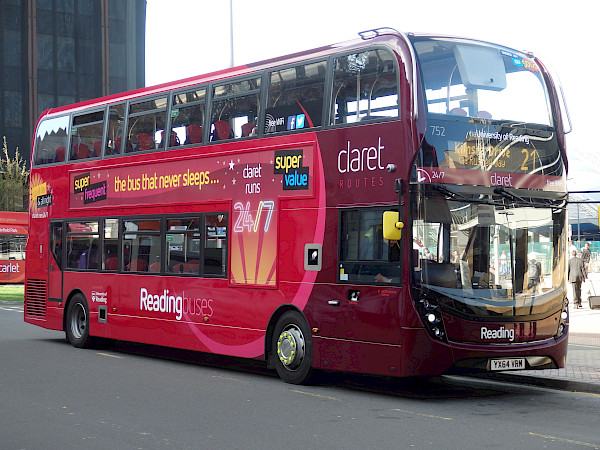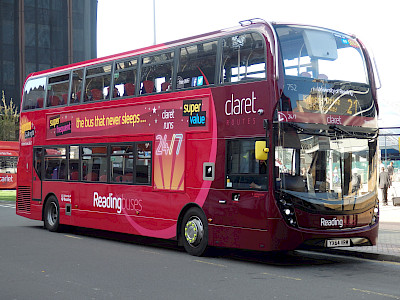
23 Aug 2016
An article written by our campaigner Matthew Bramall on how clause 21 of the new Bus Services Bill will prevent communities from accessing high quality, low cost travel. Originally published by Open Democracy.
Britain's House of Lords is debating a bill which will ban local authorities from running bus services, despite council-run buses being very successful.
Across the country, people rely on buses. In England alone there are over 4.5 billion journeys made on buses each year. Buses might seem like part of the furniture and don’t get much attention – but they are vital.
Next week the House of Lords will be debating a new Bus Services Bill. This Bill is aimed at reversing the decades of decline in passenger numbers, as passenger numbers have decreased steadily everywhere apart from London.
Whilst much will be made of the parts of the Bill that give mayors franchising powers, less is being heard about the clause that aims to ban any more local authorities from running bus companies. In one go, this small clause – clause 21 – robs communities in England of opportunities to access high quality, low cost bus travel, which evidence suggests authorities are well placed to provide. It is unnecessarily ideological and partisan, and needs to be dropped.
This isn’t to suggest that bus services should all be provided by councils. Start-up costs and other factors might make it infeasible, but, at the same time, they shouldn’t be banned from exploring the option. Many councils are able to run effective services and maintain high levels of investment, improving passenger satisfaction and comfort, whilst supporting environmental goals and keeping fares down. If the conditions are right, other councils should be allowed to consider this as an option when designing bus services. We Own It is campaigning to have Clause 21 dropped from the Bill.
The current state of local authority run bus services
In the UK, there are 12 local authorities providing bus services. These vary in size and scope, from a small service in rural Dumfries and Galloway focusing on school and social services, to large scale operations in large cities including Edinburgh, Nottingham and Reading.
Many of these services perform extremely well. In 4 of the last 5 years, local authority run buses have won Bus Operator of the Year. (In 2013, when it was a private operator that won, Reading Buses was runner up.)
As well as this, it’s worth noting that local authority bus operators perform well when it comes to the environment. Again, the awards are indicative. In the 6 years that the environmental award at the UK Bus Awards has been running, local authority providers have received gold awards twice (Nottingham 2015, Lothian 2013), silver awards three times (Nottingham 2014, Reading 2012 and 2013), and bronze once (Reading 2015).
A few examples from across the UK help to demonstrate the success stories of local authority bus companies.
Edinburgh – Lothian
Lothian is consistently one of the best performing bus operators, with a strong record of investment, and increasing passenger numbers. Recently, they won Bus Operator of the Year at the Scottish Transport Awards. They also won Bus Service of the Year, increasing passenger numbers by 50% on route 113. The Bus Services Bill aims to improve passenger numbers – proving local authorities can do this.
Lothian also won gold in the Environment category in 2013 at the national awards for their investment in diesel-electric hybrid buses and retrofitting busses with ultra-low emission exhausts. Lothian continue to invest in cleaner, better transport, and boast one of the youngest, most environmentally friendly fleets in the country.
Nottingham – Nottingham City Transport
Nottingham is a real success story. As well as boasting one of the highest passenger journeys per head outside London, they have been awarded Bus Operator of the Year award in 2012 and 2014.
They were especially praised for recording high investment, high passenger numbers and innovation in service delivery. In 2014 the judges at the Bus Awards said:
“The company's successful partnership with the local authorities and other stakeholders has enable the business to grow its customer base for 13 years in a row, enabling it to create a virtuous circle of investment, growth, staff training and rising quality – despite the uncertainties caused by economic troubles and the disruption of tramway construction works.”
Prior to this they won gold in the environment category at the Bus Awards thanks to the Electric Bus Partnership. This has led to forty-five fully electric buses being used by partners Trentbarton and Nottingham Community Transport. Thirteen more will be running by September 2016, bringing the total electric fleet to 58 vehicles – reportedly the largest fleet of electric buses in Europe.
This demonstrates that some of the arguments about local authorities being unable to achieve growth, innovation or investment are misplaced. And the fact that they work closely with the council enables some of the joined up thinking necessary for quality bus services.
Reading – Reading Buses
Reading Buses is another example of excellent service delivery by arms-length local authority companies. When they won the 2015 Bus Operator of the Year award they were praised for their “combination of innovation, strong operational performance and award-winning marketing initiatives” which “has delivered growth, strong partnerships and an engaged and well-motivated workforce.”
Much of this is made possible by increased investment. Reading Buses have been able an additional £3 million a year in the bus network (around 12-15% of its annual turnover) because it doesn't pay out dividends to private shareholders. The extra money means better quality buses, and is one reason why more people take the bus in Reading. Reading Buses are also able to maintain services on Sundays and in the evenings, when commercial operators are less likely to provide due to the lower margins.
Passengers seem to agree: “Reading Buses are run by the Council, they are pretty fantastic. The busses are colour coded by route, they are all pretty new and run regularly. I live on the busiest route and there is a bus every 6-8 minutes during peak hours and hourly all night.” Judi Passmoor
Conclusion
All of this suggests that Clause 21 of the Bus Services Bill goes too far. If the government are really intent on improving bus passenger numbers and improving services, other areas should be able to follow in the footsteps of some of the best operators out there.
At the very least, all options should be on the table. And that includes local authorities providing bus services through arms-length companies. This can reduce costs, improve passenger satisfaction, and often helps reach environmental goals. Moreover, it can help to ensure joined up service delivery and maintenance of services in the evenings and on Sundays, services which might fail profitability tests in the eyes of other providers.
Whilst some of these issues can be avoided with good franchising, enabling local authorities would offer even more benefit for passengers and this option needs to be open to authorities, particularly if other services are failing to deliver on cost, investment, reliability, or other indicators. These companies are often much more likely to be able to do the necessary joined up thinking that can create and maintain comprehensive service delivery, easy to understand fares across an area.


Comments
Angela Barnett 10 years ago
Locally elected orgainisations are answerable to their communties for the bus services they provide. No OFFWATCH set-up ever achieves the same level of local democratic accountability, so removal of local authority provision is almost certainly going to disadvantage those with the least buying power, whose only expression of need is through their democratic voice and representatives.
Reply
Simon Cooper 9 years ago
Does anyone know if this will affect TFL potentially running bus routes? They aren't a local authority but they fall under the control of The Mayor and London Assembly.
Reply
Cat 9 years ago
No - it won't affect the way London's buses are run. They can continue as they do now.
Reply